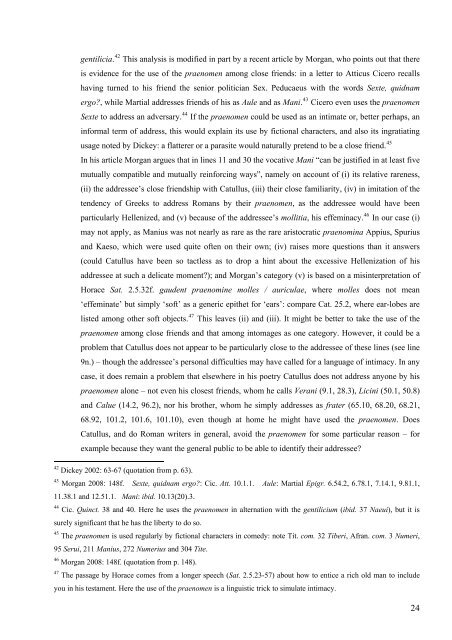CATULLUS 68 - Scuola Normale Superiore
CATULLUS 68 - Scuola Normale Superiore
CATULLUS 68 - Scuola Normale Superiore
Create successful ePaper yourself
Turn your PDF publications into a flip-book with our unique Google optimized e-Paper software.
gentilicia. 42 This analysis is modified in part by a recent article by Morgan, who points out that there<br />
is evidence for the use of the praenomen among close friends: in a letter to Atticus Cicero recalls<br />
having turned to his friend the senior politician Sex. Peducaeus with the words Sexte, quidnam<br />
ergo?, while Martial addresses friends of his as Aule and as Mani. 43 Cicero even uses the praenomen<br />
Sexte to address an adversary. 44 If the praenomen could be used as an intimate or, better perhaps, an<br />
informal term of address, this would explain its use by fictional characters, and also its ingratiating<br />
usage noted by Dickey: a flatterer or a parasite would naturally pretend to be a close friend. 45<br />
In his article Morgan argues that in lines 11 and 30 the vocative Mani “can be justified in at least five<br />
mutually compatible and mutually reinforcing ways”, namely on account of (i) its relative rareness,<br />
(ii) the addressee’s close friendship with Catullus, (iii) their close familiarity, (iv) in imitation of the<br />
tendency of Greeks to address Romans by their praenomen, as the addressee would have been<br />
particularly Hellenized, and (v) because of the addressee’s mollitia, his effeminacy. 46 In our case (i)<br />
may not apply, as Manius was not nearly as rare as the rare aristocratic praenomina Appius, Spurius<br />
and Kaeso, which were used quite often on their own; (iv) raises more questions than it answers<br />
(could Catullus have been so tactless as to drop a hint about the excessive Hellenization of his<br />
addressee at such a delicate moment?); and Morgan’s category (v) is based on a misinterpretation of<br />
Horace Sat. 2.5.32f. gaudent praenomine molles / auriculae, where molles does not mean<br />
‘effeminate’ but simply ‘soft’ as a generic epithet for ‘ears’: compare Cat. 25.2, where ear-lobes are<br />
listed among other soft objects. 47 This leaves (ii) and (iii). It might be better to take the use of the<br />
praenomen among close friends and that among intomages as one category. However, it could be a<br />
problem that Catullus does not appear to be particularly close to the addressee of these lines (see line<br />
9n.) – though the addressee’s personal difficulties may have called for a language of intimacy. In any<br />
case, it does remain a problem that elsewhere in his poetry Catullus does not address anyone by his<br />
praenomen alone – not even his closest friends, whom he calls Verani (9.1, 28.3), Licini (50.1, 50.8)<br />
and Calue (14.2, 96.2), nor his brother, whom he simply addresses as frater (65.10, <strong>68</strong>.20, <strong>68</strong>.21,<br />
<strong>68</strong>.92, 101.2, 101.6, 101.10), even though at home he might have used the praenomen. Does<br />
Catullus, and do Roman writers in general, avoid the praenomen for some particular reason – for<br />
example because they want the general public to be able to identify their addressee?<br />
42<br />
Dickey 2002: 63-67 (quotation from p. 63).<br />
43<br />
Morgan 2008: 148f. Sexte, quidnam ergo?: Cic. Att. 10.1.1. Aule: Martial Epigr. 6.54.2, 6.78.1, 7.14.1, 9.81.1,<br />
11.38.1 and 12.51.1. Mani: ibid. 10.13(20).3.<br />
44<br />
Cic. Quinct. 38 and 40. Here he uses the praenomen in alternation with the gentilicium (ibid. 37 Naeui), but it is<br />
surely significant that he has the liberty to do so.<br />
45<br />
The praenomen is used regularly by fictional characters in comedy: note Tit. com. 32 Tiberi, Afran. com. 3 Numeri,<br />
95 Serui, 211 Manius, 272 Numerius and 304 Tite.<br />
46<br />
Morgan 2008: 148f. (quotation from p. 148).<br />
47<br />
The passage by Horace comes from a longer speech (Sat. 2.5.23-57) about how to entice a rich old man to include<br />
you in his testament. Here the use of the praenomen is a linguistic trick to simulate intimacy.<br />
24






